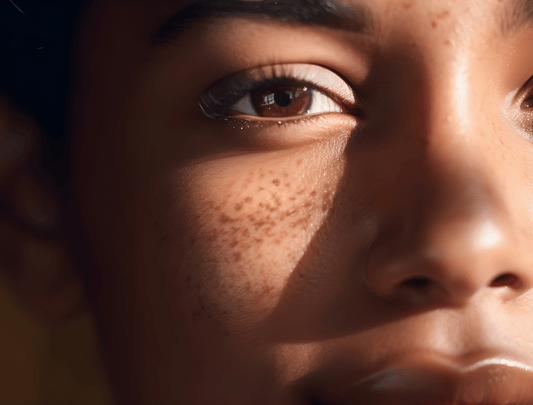Pregnancy is a time of immense joy and anticipation, accompanied by a heightened awareness of what goes into your body. This mindfulness extends to skincare, where certain ingredients might pose potential risks or the safety is simply not well-studied for pregnant women. Understanding which skincare ingredients to avoid is essential and below you’ll learn more about what to eliminate from your skincare cabinet as well as safer additions to reach for during this delicate season.
RETINOIDS (Retinol, Retin-A):
Retinoids, known for their potent anti-aging properties, are best avoided during pregnancy. High doses of vitamin A, often found in retinoid formulations, can potentially harm the developing fetus. While the risk is associated with oral intake rather than topical application, it's advisable to err on the side of caution and choose pregnancy-safe alternatives.
SAFE SWAP: Air Barrier Care Cream
SALICYLIC ACID >2%:
Salicylic acid, a popular ingredient in acne-fighting products, falls under the category of beta hydroxy acids (BHAs). While the risk of topical salicylic acid causing harm is considered low, it's recommended to limit its use during pregnancy and avoid high concentrations of the ingredient.
SAFE SWAP: Omni Complexion Care Serum
BENZOYL PEROXIDE:
Benzoyl peroxide is another common acne-fighting ingredient that is generally best avoided during pregnancy. There is limited research on its safety during this period, and opting for alternative acne treatments is a prudent choice.
HYDROQUINONE:
Hydroquinone, a skin-lightening agent, is often used to treat hyperpigmentation; however, its safety during pregnancy is uncertain and experts are concerned about the high systemic absorption rate from the skin into the bloodstream. For this reason, it is recommended that hydroquinone be swapped for other gentler ingredients when looking to improve discoloration.
SAFE SWAP: Spotlight Pigment Correcting Serum
FORMALDEHYDE & FORMALDEHYDE-RELEASING PRESERVATIVES:
Formaldehyde and preservatives that release formaldehyde, such as quaternium-15 and DMDM hydantoin, are best avoided during pregnancy due to their potential links to developmental issues.
ESSENTIAL OILS:
While many essential oils are safe for use, some can be potent and may cause skin irritation or have unknown effects during pregnancy. It's recommended to be cautious and avoid oils like clary sage, rosemary, and sage during this time. Opt for pregnancy-safe essential oils like lavender or chamomile in diluted forms.
PHTHALATES:
Phthalates are often found in fragrances and may disrupt the endocrine system. While the direct impact of topical phthalate exposure during pregnancy is not fully understood, it's a good practice to choose fragrance-free products or those scented with natural extracts.
CHEMICAL SUNSCREEN:
Certain chemical sunscreen ingredients (homosalate, oxybenzone, octocrylene, avobenzone) are not recommended during pregnancy due to the potential to penetrate the skin, absorb into the bloodstream, and potentially disrupt hormone regulation. As research on the effects during pregnancy is limited, it is advisable for pregnant individuals to avoid chemical sunscreens and reach for mineral sunscreens containing zinc oxide or titanium dioxide instead.
ALPHA ARBUTIN & BEARBERRY EXTRACT:
Due to concerns about the systemic absorption of hydroquinone and its potential risks, it is generally best to also avoid arbutin (a precursor to hydroquinone) and bearberry (a hydroquinone derivative) during pregnancy as they haven’t been well studied.
SAFE SWAP: Spotlight Pigment Correcting Serum
ORAL MEDICATIONS:
Popular medications such as Isotretinoin (Accutane) and Tetracycline (or its derivatives Doxycycline and Minocycle) are used to treat a range of skin diseases, but have proven to have detrimental effects on both future moms and their fetuses.
COSMETIC INJECTIONS:
A lack of studies to demonstrate the safety of neuromodulators (such as Botox) and soft tissue fillers on an expectant mother and unborn fetus puts aesthetic injectable treatments in the unsafe category. Wave farewell to your injector for now and meet with your OB-Gyn after you are finished breastfeeding for the “okay” to get back into your injectable maintenance routine.
CONCLUSION:
Navigating skincare during pregnancy involves making thoughtful choices for the health and well-being of both the expectant mother and the baby. While avoiding certain ingredients, it's equally important to consult with your healthcare provider for personalized advice based on your individual circumstances. Embrace a pregnancy-safe skincare routine that prioritizes simplicity, nourishment, and the radiant well-being of your changing skin.



